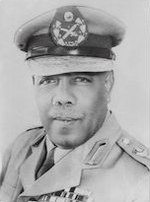Ibrahim Abboud, Date of Birth, Place of Birth, Date of Death
TweetIbrahim Abboud
President of SudanAbout Ibrahim Abboud
- El Ferik Ibrahim Abboud (Arabic: ??????? ?????, Suakin 26 October 1900 – Khartoum 8 September 1983) was a Sudanese president, general, and political figure.
- A career soldier, Abboud served in World War II in Egypt and Iraq.
- In 1949, Abboud became the deputy Commander in Chief of the Sudanese military.
- Upon independence, Abboud became the Commander in Chief of the Military of Sudan.
- He served as the head of state of Sudan between 1958 and 1964 and as president of Sudan in 1964; however, he soon resigned, ending Sudan's first period of military rule.Ibrahim Abboud was born 26 October 1900 at Mohammed-Gol, near the old port city of Suakin on the Red Sea.
- He trained as an engineer at the Gordon Memorial College and at the Military College in Khartoum.
- He received a commission in the Egyptian Army in 1918 and transferred to the Sudan Defence Force in 1925, after its creation separate from the Egyptian army.
- During World War II he served in Eritrea, in Ethiopia, with the Sudan Defence Force, and with the British army in North Africa.
- After the war, Abboud rose rapidly to commander of the Sudan Defence Force in 1949 and assistant commander in chief in 1954.
- With the declaration of independence for the Sudan in 1956, he was made commander in chief of the Sudanese military forces.
- After the Sudanese army staged a coup d'état in November 1958, overthrowing the civilian government of Abdullah Khalil, Gen.
- Abboud led the new military government. Between 1956 and 1958, Sudanese nationalist leaders from both major parties sought to find solutions to the seemingly intractable problems of building a nation, developing the economy and creating a permanent constitution.
- Neither Ismail al-Azhari, leader of the Nationalist Unionist party and the first prime minister of the Sudan, nor his rival, Abdullah Khalil, the Umma party leader and successor to al-Azhari as prime minister, was able to overcome the weaknesses of the political system or to grapple with the country's problems.
- Parliamentary government was so discredited that Gen.
- Abboud, who formerly had remained studiously aloof from politics, led a coup d'état on 17 November 1958, to end, in his words, "the state of degeneration, chaos, and instability of the country." The Council of State and cabinet were dismissed, parliament and all political parties were declared dissolved, and the constitution was suspended.
Read more at Wikipedia
See Also
- Famous People's Birthdays on 26 October, Sudan
- Famous People's Birthdays in October, Sudan
- Famous politician's Birthdays on 26 October, Sudan
- Famous politician's Birthdays in October, Sudan
- Famous military officer's Birthdays on 26 October, Sudan
- Famous military officer's Birthdays in October, Sudan


 Date of Birth:
Date of Birth:  Place of Birth: Suakin, Red Sea, Sudan
Place of Birth: Suakin, Red Sea, Sudan